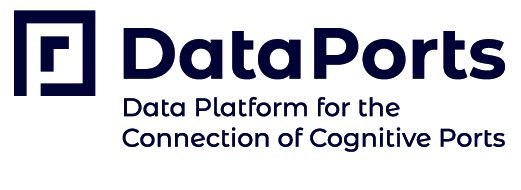The DataPorts project will focus on the following set of specific research and innovation objectives:

Address real-life data market use cases in two relevant European seaports, two global use cases and related communities
Current solutions do not rely on existing tools for acquisition, aggregation, processing and analysis of the data coming from the different stakeholders, sources and existing platforms, including pilot deployment and evaluation of progress against benchmarking-existing deployments KPI’s.

Design and validate next-generation set of advanced interoperable data related and AI based services
Bringing improved data acquisition mechanisms, data sanitization algorithms to guarantee data quality; create machine learning models over a variety of privacy-preserving scenarios; ability of federating data varying in syntax and semantics; and efficient and effective techniques for data wrapping that will represent the underlying mechanism for supporting selective release, storage and analytics on data enabling efficient processing over protected data while preventing (or limiting) access to the actual data content by other parties.

Define an engineering methodology facilitating application of DataPorts architecture and tools
Support cognitive, privacy-aware, secure data sharing processes in adequate locations within the DataPorts platform and a guide to automate each process.

Define, design and incorporate a novel, scalable, resilient, semantic approach for data sharing
Builds upon existing semantic interoperability solutions, annotating data at selected points in the multi-layer architecture, improves data quality, and enables a variety of features, such as application of reasoning, semantic rule engines, semantic translation, and more. Novel semantic solutions for Big Data analytics will be developed and analysed.

Define, design and provide a data governance framework and associated tools for the DataPorts architecture.
The issue of significantly improving the trust of stakeholders of the logistics domain so that they share their data with other business counterparts or with third party service providers is a dominant one in industrial data spaces. Recent advances in the blockchain technology, including smart contracts, have created a transparent environment for auditing transactions across the chain and for ensuring only verified transactions are being compensated for. DataPorts will introduce a novel, decentralised architecture, where business analytics or AI-driven decisions are recorded on a datapoint-by-datapoint basis, on a blockchain.

Impact creation
Besides standard dissemination activities, DataPorts will perform two showcases including demonstrations, to widely present main outcomes and promote concrete advantages of using data spaces in ports of the future, to stakeholders and potential clients. Exploitation and business models are also means to strengthen impact and they will be goals of DataPorts.

Establishment of a new cooperation and business framework
DataPorts will define and validate credible and scalable business models, which will ensure wide and sustainable use of the proposed solution. Business modelling will be fully aligned with technical capabilities of the ecosystem and functionalities of deployed pilots. In addition to devising credible and viable business models, action will attempt at their generalization and extendibility towards reuse in scope of cross domain environments. Furthermore, the action will introduce and validate a framework for regulatory analysis, including privacy and ethics aspects, as part of a holistic approach to reach a reliable implementation.
